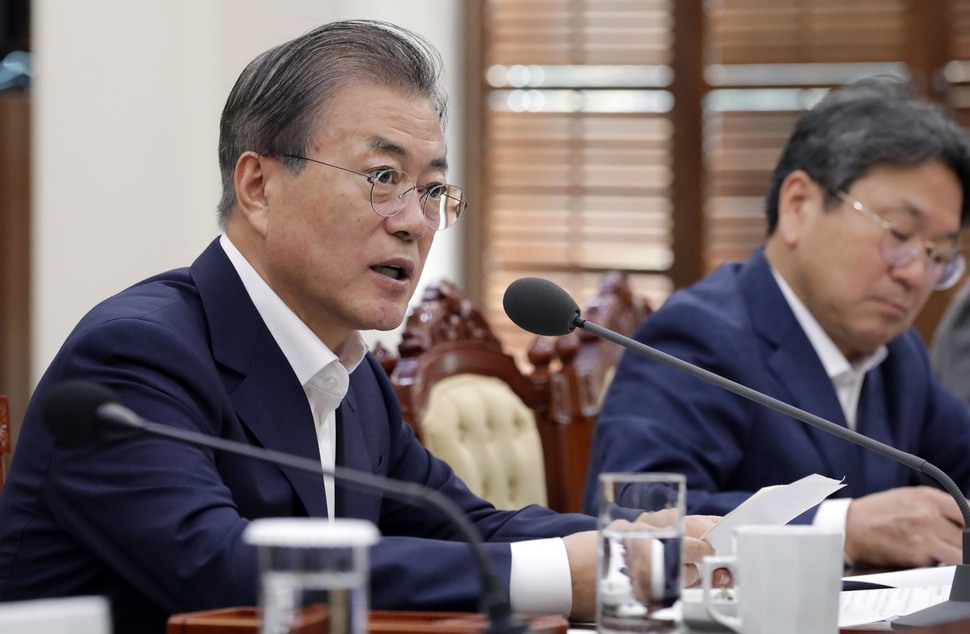 |
|
South Korean President Moon Jae-in makes remarks during a Blue House meeting after receiving a report from Justice Minister Cho Kuk on Sept. 30. (provided by the Blue House)
|
S. Korean president explicitly instructs prosecutor-general to come up with reformation plan
During a briefing by the Ministry of Justice on Sept. 30, South Korean President Moon Jae-in indicated that he means to personally shepherd reform of the country’s public prosecutors, while calling on Prosecutor-General Yoon Seok-youl to come up with a plan for reform. Moon’s remarks suggest that he means to take full advantage of the momentum provided by the huge candlelight rally held this past weekend in support of his reform drive. “The president has probably concluded that he mustn’t let this opportunity go by,” said a key official at the Blue House. Another senior official predicted that “more measures will likely be taken going forward.” Kicking off “simultaneous reformation” both within and without the prosecutors Moon’s instructions can be summarized as a warning, both for Yoon in particular and the prosecutors in general, that they shouldn’t pretend to be bystanders any longer. “Under this administration, the prosecutors’ power to carry out independent investigations has been greatly strengthened, but many have called for reforms in the exercise of prosecutorial authority, standard investigation procedures, and organizational culture,” Moon said. He was criticizing the prosecutors for retaining old customs in exercising their newfound autonomy and authority. Moon also gave explicit “instructions to the prosecutor-general” to quickly devise a reform plan “while listening to the voice of the public and canvassing diverse opinions [in your organization], including young prosecutors, female prosecutors, the criminal division, and the trial division.” “The prosecutors have been repeating bland rhetoric despite the president’s warnings. Moon has specifically asked them to take the steps that are possible now instead of making excuses about the legislation being held up at the National Assembly,” said an official at the Blue House. Some analysts think that Moon gave these instructions to the prosecutor-general to show that the reform he’s personally championing is being carried out simultaneously both within and without the prosecutors. According to this viewpoint, Moon believes that, despite the strong public support for prosecutorial reform, “surgical” reform imposed unilaterally from the outside is likely to be limited in effect and might provoke strong opposition. That also helps explain Moon’s remark on Monday that “the prosecutors and the Justice Ministry are the agents of prosecutorial reform, and they must work together toward that end.” Indications prosecutors will be reined in through personnel appointments Another noteworthy aspect of Moon’s remarks on Monday was his confirmation that he means to exercise his power of appointments to bring the prosecutors to heel. “Moon conveyed his intention to accept the advice of Justice Minister Cho Kuk in regard to filling vacant spots at the Supreme Prosecutors’ Office (SPO), namely the chief of inspection headquarters and the director-general of the Administration Bureau,” said Blue House Spokesperson Ko Min-jung. While it has been customary for the prosecutor-general to have a say in appointments to key positions at the office, this announcement indicates that the Justice Minister will henceforth disregard that custom and take the lead in making such appointments. In effect, this message emphasizes that it’s Cho responsibility to oversee prosecutorial reform, and that he’ll take the initiative in doing so. “Reflect on your failings”: a shift toward downsizing the special investigations division Moon also indicated that he’ll be moving away from his initial tolerance for an expansion of the special investigations division of the prosecutors during his campaign to extirpate “deep-rooted vices” and will be reorienting prosecutorial reform on shrinking the organization’s ability to conduct its own investigations. “Not only the prosecutors but also the Justice Ministry and I as president must humbly listen to the public’s demand for prosecutorial reform and reflect upon our inadequacies. I think that the steps proposed by the justice minister to reinforce the prosecutors’ criminal division and trial division and to revise the rules for disclosing the identity of criminal suspects are all necessary measures for prosecutorial reform,” Moon said. “The president was telling Yoon to heed the opinions of the prosecutors who represent the majority of the organization instead of relying upon the special investigations division,” a high-ranking official at the Blue House said. But some legal experts are criticizing Moon for changing his policy about the practices of the special investigations division now, possibly because of its probe into Cho and his family, after letting them slide for so long. In apparent awareness of such criticism, Moon said, “If these measures are confirmed and implemented right now, they could be misunderstood as an attempt to quash the prosecutors’ [ongoing] investigation. The measures should be prepared for confirmation and implementation as soon as the investigation into Cho has concluded.” The Blue House also dismissed criticism that Moon’s remarks could squeeze the investigation into Cho and his family, explaining that “Moon was not condemning the investigation itself, but the way these investigations are typically conducted.” By Seong Yeon-cheol, staff reporter Please direct comments or questions to [english@hani.co.kr]






